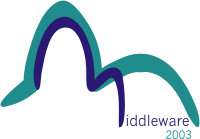 |
Middleware 2003 ACM/IFIP/USENIX International Middleware ConferenceRio Othon Palace Hotel Rio de Janeiro, Brazil 16-20 June 2003 |
|
|
Website Mirror at the University of São Paulo |
Tutorial 2: Peer-to-Peer Technologies for MiddlewareAbstract``Peer-to-Peer'' refers to a class of systems and applications that employ distributed resources (i.e., computing power, networking resources) to perform a task (i.e., content delivery, collaboration, e-commerce) in a decentralized manner on general-purpose operating systems and platforms. Peer-to-Peer (P2P) systems are increasingly becoming popular because they provide opportunities for real-time communication, ad-hoc collaboration and information sharing in a large-scale distributed environment. Much research effort has focused lately on understanding the issues and solving the research problems in the P2P systems. This tutorial introduces P2P computing and gives examples of P2P taxonomies, applications and characteristics. It discusses important research problems including scalability, self-organization and management, performance, fault tolerance, distributed location, routing and security. It reviews current P2P systems, ranging from popular file sharing applications such as Napster and Gnutella, to global-scale persistent storage such as OceanStore, Pastry, Chord and JXTA, in terms of functionality, efficiency, scalability, performance and other criteria and highlights their similarities and differences. We will also discuss how P2P compares with the client-server and other models (distributed computing, grid computing and ad-hoc networks) which are frequently associated with P2P. We will describe advantages and disadvantages. In the second part of the tutorial we will discuss the fundamental research problems in P2P systems. In particular, we will address the following issues:
The tutorial will be a half-day presentation and numerous practical examples will be given throughout the tutorial. Target AudienceThis tutorial is intended for researchers, architects, implementers and users who desire a better understanding of the fundamental concepts and advantages of peer-to-peer technologies and their research problems. This tutorial assumes familiarity with basic middleware concepts. Speaker ProfileVana Kalogeraki is an Assistant Professor at the University of California, Riverside. Her research interests include peer-to-peer systems, distributed and real-time systems and resource management. She received her Ph.D. from the University of California, Santa Barbara. As a member of the Eternal project, her Ph.D. was in the area of resource management middleware for real-time fault-tolerant distributed systems. During 2001-2002 she held a Research Scientist Position at Hewlett-Packard Labs in Palo Alto, CA where she was leading research on peer-to-peer middleware. Dr. Kalogeraki has published many technical papers on the topics of peer-to-peer computing, distributed and real-time systems and contributed to books. She has delivered tutorials and seminars on peer-to-peer computing. She is the Program co-Chair of the ``International Workshop on Databases, Information Systems and Peer-to-Peer Computing'' at VLDB'2003. She has participated in the peer-to-peer working group and the Object Management Group (OMG) standardization efforts and she has co-authored the CORBA Dynamic Scheduling Standard. She holds an M.S. and a B.S. from the University of Crete, Greece. |
|
Latest update: 28 May 2003 - Questions and Comments about the Site: fmc@inf.ufg.br |